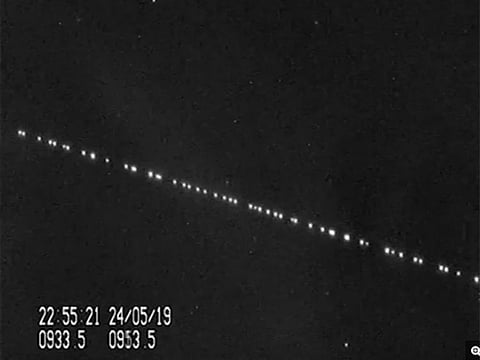Video: The reason why the UAE saw a row of lights in the sky
A series of strange lights recently passed through the skies of the UAE and Arab region

Also In This Package
Dubai: An eerie row of lights zipped past the night skies during the last few days, but the phenomena was not limited to just the UAE.
Residents across the globe turned to the stars to catch the train of lights that passed high above them. But the glow was not caused by stars but generated by Elon Musk’s very own satellite train.
On May 24, SpaceX launched its first 60 Starlink satellites into orbit – the first chunk of the 12,000 satellite project expected to be completed by 2025 at a cost of $10 billion. The project, according to SpaceX’s CEO Musk, aims to provide internet access to several billion people around the world at a low cost.
A day after the launch, Netherlands-based satellite tracker Marco Langbroek captured footage of the satellite train, which stunned space fans.
The video was posted on Langbroek’s blog SatTrackCam:
On his blog, Langbroek described how he was able to calculate the precise moment when the satellite train passed overhead.
“There were no orbital elements for the objects available yet on Space-Track, but based on the orbital information (53 degree inclination, initially 440 km orbital altitude) I had calculated a search orbit and stood ready with my camera.
“My search orbit turned out to be not too bad: very close in sky track, and with the objects passing some 3 minutes early on the predictions. And what a SPECTACULAR view it was! It started with two faint, flashing objects moving into the field of view. Then, a few tens of seconds later, my jaw dropped as the ‘train’ entered the field of view,” he said.
Several days after the project’s launch, the satellite train soon made its way over the skies of the UAE and the Arab region.
Mohammad Shawkat Odeh, Director of the International Astronomy Center, said that the satellites launched last week looked like faint stars, which all moved at the same speed and in the same direction.
They could not however, have been seen in bright cities and needed a dark sky in order to be visible to the naked eye.
“The brightness of the satellites will gradually decrease as they reach their final destination, so they will not be burning as bright as when they first started. I think this particular incident generated worldwide attention due to its striking and unusual features,” said Odeh.
Sign up for the Daily Briefing
Get the latest news and updates straight to your inbox




